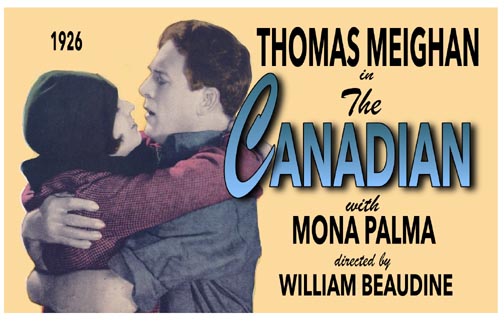

Paramount Pictures
directed by William Beaudine
New York premiere December 6, 1926
Cast: Thomas Meighan (Frank Taylor), Mona Palma (Nora), Wyndham
Standing (Ed Marsh), Dale Fuller (Gertie), Charles Winninger (Pop
Tyson), Billy butts (Buck Golder)
"Historians and critics have paid little attention to Tommy Meighan over the years, and virtually every reference to him found in works dealing with the screeen during the twenties merely mention his name. . ." (1). Author and historian Kalton C. Lahue made this assessment back in 1972 in his book "Gentlemen to the Rescue," and he is right on target - still decades later. If one looks back at some of the outstanding books on silent film such as Kevin Brownlow's "The Parade's Gone By" (University of California Press, 1968), Edward Wagenknecht's "Movies in an Age of Innocence" (University of Oklahoma Press, 1962), William K. Everson's "American Silent Film" (Oxford University Press, 1978) or James Card's "Seductive Cinema" (Alfred A. Knopf, 1994), there will be references to Meighan only in his association with Cecil B. DeMille for whom he starred in a trio of films in the late 'teens and early twenties - or "The Miracle Man" (1919) which one has to assume gets notice only because of Lon Chaney's role in it. Even biographical collections such as Anthony Slide's "Silent Players" (University Press of Kentucky, 2002), Eve Golden's "Golden Images" (McFarland & Co., 2001), or Lon Davis' "Silent Lives" (BearManor Media, 2008) fail to include Meighan among their stars to remember.
Hopefully, now that Grapevine Video has made Meighan's 1926
drama "The Canadian" available for home viewing, his
star quality will gain a few more points in the eyes of silent
movie 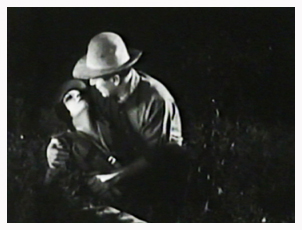 fans. Sure, we've had the DeMille
films - "Male and Female" (1919), "Why Change Your
Wife" (1920), and "Manslaughter" (1922) available
to us on DVD or on TCM - as well as some of his other performances
such as "Conrad in Quest of His Youth" (1920), "The
Mating Call" (1928) and "The Racket" (1928); however,
his performance in "The Canadian" may well stand out
among all of these.
fans. Sure, we've had the DeMille
films - "Male and Female" (1919), "Why Change Your
Wife" (1920), and "Manslaughter" (1922) available
to us on DVD or on TCM - as well as some of his other performances
such as "Conrad in Quest of His Youth" (1920), "The
Mating Call" (1928) and "The Racket" (1928); however,
his performance in "The Canadian" may well stand out
among all of these.
It reminds one of F.W. Murnau's most beautiful tale "City Girl" (1930) in that the trials and tribulations of the wheat farmer form the backdrop for the two films. And although "City Girl" may remain the better of the two, there is worthy comparison in the intensity of the drama offered by both and the satisfaction the viewer will find at the end of the story as a result of the fine acting, excellent direction, solid story and emotional high that is experienced.
Frank Taylor (Meighan) is working on Ed Marsh's (Standing) farm along with several other hands, but is soon to leave for his own farm and the small three-room shack he calls home. Gertie (Fuller), Marsh's wife, is essentially the "drudge"of the house, cooking for the hands and keeping up the home, but she doesn't complain as hers and Marsh's marriage is a good one, and she obviously enjoys the comraderie of the farmhands - that is, until Marsh's sister comes to stay with them. This is necessitated after the death of the sister's rich aunt who supported her and apparently left her nothing. Marsh, an Englishman himself, has adapted well to the harsh farm life in Canada; however, Nora has known only the pampered, proper and sophisticated life of England and the social life of Paris or the Riviera. Nora silently makes her distaste for life in rural Canada known in subtle ways and proves to be inept in the kitchen and trying to help with the chores. The dislike the two women have for each other becomes obvious. This comes to a head one day when all the men are gathered around the table for lunch.
Pop says to Frank, "That shack of o'yourn must be awful lonesome. Why don't you get married?"
Jokingly, Frank responds, "Well, maybe I'll stop at the Indian Agency and get me a squaw. I need a wife to cook and sew and clean for me." When Pop suggests he use a matrimonial agency, Frank jokes, "Oh, I'm not particular. So long as she's a good worker, and not cross-eyed, most anybody'll do." Noticing Nora's disapproval, Franks takes the joking a step further. "Hope I have better luck than Penny Simpson. His wife broke her leg, and he had to shoot her!" Everyone around the table laughs heartily except Nora, who is offended at such humor and gets up to leave.
"I wonder why Nora's running away. She ain't in no danger," Gertie says to Frank.
Nora overhears, and, as she reaches the foot of the stairs, turns to Gertie, "I'm not accustomed to such talk about -- marriage."
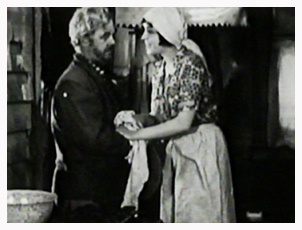 Referring to an earlier blunder
in the kitchen, Gertie tells her, "A hell of a wife you'd
make! You can't even cook rice!"
Referring to an earlier blunder
in the kitchen, Gertie tells her, "A hell of a wife you'd
make! You can't even cook rice!"
Unfazed, and with a very superior air and look on her face, Nora very calmly answers, "You must remember that I never had the advantages of early training as a servant."
At this, Gertie literally explodes, Nora goes upstairs, and Marsh tries his best to calm his wife. The men, having finished eating, go back to the fields, but Gertie will not be placated and demands of her husband that Nora apologize. Marsh goes upstairs and pleads with his sister. At first refusing, she finally agrees in consideration for her brother. Yet, when she apologizes, Gertie is not satisfied telling Nora she wants an apology in front of the men since the offense took place with the men present. This is almost more than Nora can bear, but she agrees and does so.
As the men are walking out of the house, Frank is last and has his hand on the door. Nora tells him to wait. "You said you needed a wife - to cook and sew and clean for you. Will I do?" Still looking very stern and likely suspicious, he pauses. She asks again -- and without a change in expression, he nods "yes." "I'll be ready in five minutes," she tells him.
Thus begins the story of the marriage of these two. However, for Nora, it is a working arrangement only, and for weeks Frank agrees to this giving her the bedroom while he sleeps in the barn. The film continues to keep the viewer riveted with more extremely emotional and intense scenes. Outstanding among these is when Frank demands the "privileges" of a husband. Almost startling in a film of this period - especially for the hero of our film here - Frank finally takes her in his arms and kisses her. Also atypical for most stories, she does not melt in his arms but is, instead, furious, and slaps him. When he grabs her again and kisses her, more forcefully this time, she pulls away falling back against the wall. furious that he has forced his attentions on her. She looks around and notices the rifle on the wall beside her. She takes it down, points at him angrily and threatens to shoot. "You don't have the nerve to shoot anyone," he tells her. Then we see a close-up of the trigger and hammer. She pulls the trigger, the hammer falls, but the gun isn't loaded. She runs to the bedroom and locks the door. Although he hesitates, he finally tries to open the door, but it's locked. She's inside sobbing, begging him to leave her alone. However, our hero then takes his fist and knocks a hole in the door, goes inside, takes the top of her dress and pulls it back and takes her in his arms. Fade out.
Again, not what we would expect in most films of this period, but what a strong and emotional scene! The next morning when she opens the bedroom door with the top of her dress torn, there is no mistaking what took place the night before. One thing that we expect in these movies - and it's not revealing anything that would spoil the story for the first time viewer - is that Nora does eventually fall in love with Frank.
Picture Play said the movie "played at slow tempo," (2) and somewhat similarly, Motion Picture Classic said, "It's a quiet picture." (3) Yet, one can see from the scenes outlined above, there are certainly moments in the film that are far from "quiet," and we would argue that because of the grip it has on the viewer for the entire 81 minutes, the viewer will not say it has a "slow tempo" when "The End" flashes on the screen. Nevertheless, we will admit that it is not an action picture. There are no brawls, no race to the rescue, no feats of daring. Picture Play said it "is good because it is a study of character," (4) and this is an apt assessment because it is the interaction of the two main characters - Nora and Frank - that provides the main appeal of this story.
Virtual unknown Mona Palma is excellent as Nora. Little
is known of her since she made only seven films - five before
"The Canadian" and one afterward. It is curious that
her career ended in 1927 because she certainly had the talent
and the beauty to have continued in films. She lived a long life
having been born in 1897 and passing away in 1989. (5) The
New York Times reviewer said, "Mona Palma . . . goes
through this picture without a smile. And she is right, for the
character she impersonates is suddenly thrust into a circle of
people whose lives 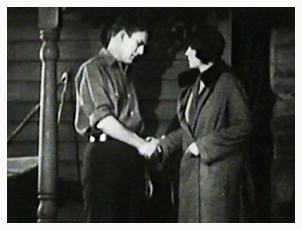 are a startling contrast
to the way in which she has been living in England." (6)
Harrison's Reports said she "does pretty good work,"
and Picture Play said "Mona Palma is appropriately
icy as Nora." (7) Palma does a fine job of exuding the "iciness"
required for the part, which mostly calls for her to be very reserved
and even expressionless in much of the film, but no one can deny
the impact of her performance when Meighan's character forces
himself on her - the disgust she exhibits after he kisses her
as she wipes her mouth, the emotions she feels when she has finally
called up enough nerve to pull the trigger on the gun only to
realize it is not loaded, and the fear and hopelessness she feels
as she is trapped in the bedroom and Meighan's fist bursts through
the door. First rate acting!
are a startling contrast
to the way in which she has been living in England." (6)
Harrison's Reports said she "does pretty good work,"
and Picture Play said "Mona Palma is appropriately
icy as Nora." (7) Palma does a fine job of exuding the "iciness"
required for the part, which mostly calls for her to be very reserved
and even expressionless in much of the film, but no one can deny
the impact of her performance when Meighan's character forces
himself on her - the disgust she exhibits after he kisses her
as she wipes her mouth, the emotions she feels when she has finally
called up enough nerve to pull the trigger on the gun only to
realize it is not loaded, and the fear and hopelessness she feels
as she is trapped in the bedroom and Meighan's fist bursts through
the door. First rate acting!
Meighan is equally well-suited for this part with reviews like the one in Picture Play stating that "The Canadian" "offers Meighan his best role in many moons."(8) Meighan is quiet and low-key, observing the sparks between Gertie and Nora with a "matter-of-factness" that leaves one wondering what he is thinking. His reaction when Nora offers to be his wife is just as it should be - unemotional and thoughtful, but accepting of her proposal. He typifies the quiet, but strong and ambitious toiler who wants to make it on his own rather than spend his life working for someone else. He wins the viewer's admiration when Nora moves in, and he gives her the bedroom while sleeping on a bench with some covers thrown over him in the next room. Going back to the scene mentioned above -- it is not surprising that after weeks of this arrangement (he did move to sleeping in the barn, somewhat more comfortable quarters), Frank feels he deserves some sign of affection from Nora - after all, she is his wife. As she sits and sews one evening, he says, "Do you realize you've been my wife for weeks - and you've never even kissed me?" She looks at him coldly and gets up to walk away. He takes her by the arm and gives her a kiss - not a forceful one - but quickly and as one would give saying "good night." We can only wonder what the progression would have been here if she had not reacted by slapping him. We would assume most viewers would feel no disagreement with him when he takes her in his arms again and gives her a more forceful kiss this time. But, as noted earlier, she backs away, wipes her mouth in disgust, grabs the rifle and points it at him. Meighan remains stoic through it all. And when he drives his fist through the door to get into the bedroom, we don't see a wild man, wide-eyed and sex-crazed. He moves very slowly, stoicly and deliberately. As the scene fades, he has taken her very strongly in his arms, not "manhandling" her, as one would think. Good direction here in a scene that could make the viewer "turn" on the story's hero, but doesn't.
The scene the next morning also helps to alleviate any thoughts the viewer may have of Meighan's character being a "brute." We see Frank at the table drinking coffee. Nora slowly opens the door and looks out at him, hurt, defeated. He glances up at her - only very briefly -- and back down again, almost ashamedly. He doesn't want to make eye contact. At that, she goes back into the room, and he goes out to the fields.
As noted at the beginning of this commentary, it is a shame that Meighan has not received more attention from historians. No, he didn't have the sensational personal life of many of the other stars, but he was a stalwart throughout the silent era and very popular with the fans. In a poll of fans in 1924, Photoplay ranked Meighan fifth only behind megastars such as Mary Pickford, Douglas Fairbanks, Gloria Swanson and Pola Negri. In a Film Daily poll that same year, he was ranked fourth behind Harold Lloyd, Gloria Swanson and Tom Mix - the only one other than Gloria Swanson to appear in the top five in both polls. (9) Historian Benjamin B. Hampton said that at one point in the twenties, "The salaries paid to stars by employing producers settled to a basis of approximately $7,000 a week at the top - although Thomas Meighan, Pola Negri, Tom Mix, Colleen Moore, and a few others exceeded this figure . . ." (10) Without a doubt, the fans loved him.
Meighan was already 47 years old when he portrayed Frank Taylor in "The Canadian," although one would think he was much younger. Unfortunately, he was to only live another nine years passing away in 1936 from cancer.
Probably not too many silent movie fans will recognize the
name of Dale Fuller although she can be seen in such big-name
pictures as "Greed" (1924), "The Merry Widow"
(1925), "Ben 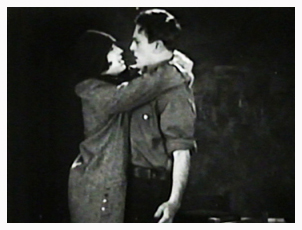 Hur" (1925),
"The Wedding March" (1928) and others. She can also
be seen in many comedy shorts from the era beginning with Mack
Sennett in the 'teens. Not surprisingly after seeing her in this
film, of all the cast, she won the praise of the critics more
than anyone else. Picture Play said, "Dale Fuller
is capital as the vixenish Gertie." (11) Variety said,
"Miss Fuller's performance is a capital effort. Perhaps the
best of the cast." (12) Her scenes as the overwrought frontier
wife who feeds a large group of men every day and deals with the
harsh lifestyle into which she's been thrust is superb. Her interaction
with Nora is telling in both expression and word. Her "hurt"
at the affront from her sister-in-law is genuine, yet unyielding
when she demands an apology on her terms. No wonder she caught
the attention of the critics!
Hur" (1925),
"The Wedding March" (1928) and others. She can also
be seen in many comedy shorts from the era beginning with Mack
Sennett in the 'teens. Not surprisingly after seeing her in this
film, of all the cast, she won the praise of the critics more
than anyone else. Picture Play said, "Dale Fuller
is capital as the vixenish Gertie." (11) Variety said,
"Miss Fuller's performance is a capital effort. Perhaps the
best of the cast." (12) Her scenes as the overwrought frontier
wife who feeds a large group of men every day and deals with the
harsh lifestyle into which she's been thrust is superb. Her interaction
with Nora is telling in both expression and word. Her "hurt"
at the affront from her sister-in-law is genuine, yet unyielding
when she demands an apology on her terms. No wonder she caught
the attention of the critics!
So far, we have not mentioned director William Beaudine, although he deserves immense credit for a first-class directorial effort - an effort that also did not go unnoticed by the critics. His silent career was a varied one with many comedy shorts to his credit, as well as lightweight feature comedies with the likes of Wesley Barry, Marie Prevost, Dorothy DeVore, Douglas McLean, Charlie Murray, Laura LaPlante and many others. However, he also directed Mary Pickford in two of her best films, "Little Annie Rooney" (1925) and "Sparrows" (1926). But Beaudine was better than the credit he has received, as evidenced by "The Canadian" (as well as other notable efforts) and the fact that he had a successful directorial career spanning over 370 films that included a long tenure in the sound era and many TV credits.
"The Canadian" was filmed on location near High River, a farm town about 30 miles south of Calgary, Canada. The cast and crew were there for about a month with interiors shot in New York. Beaudine actually never got to see a completed version of the film until 1970. It had been discovered in 1969, and he was invited to view it at the Los Angeles County Museum of Art in February 1970. He commented, "I'm very surprised. Why, I was quite a good director in spots." It was an especially meaningful opportunity for Beaudine since he passed away the next month at age 78. (13)
Unfortunately, reviews were mixed for the film. Photoplay essentially panned it. "Here's Tommie Meighan as a Canadian farmer, though there is really nothing of consequence in this tid-bit. The direction and acting are good but the story has no objective - with the result that it relies on the appeal of its star for its popularity." (14) . . . as did Harrison's Reports: "Fairly good - nothing extraordinary . . . Some sympathy is awakened here and there but the unhappiness outweighs the happiness." (15) Picture Play, on the other hand, said it was "good" and "well worth seeing." (16) Surprisingly, The New York Times was probably the most enthusiastic. "Thomas Meighan has taken a leap in the right direction in the film transcription of W. Somerset Maugham's play 'The Land of Promise' . . . It is a stirring drama produced with intelligent restraint and even the light interludes come and go in a natural fashion, actually serving as a relief to this rugged tale of the great Canadian wheat fields." (17) On a side note, Meighan had starred in a 1917 version of this story which carried Maugham's original title, "The Land of Promise" (Famous Players Film Company) and co-starred Billie Burke as Nora.
"The Canadian" is a top-notch release from Grapevine. It is an excellent story with an equally excellent cast. The print quality is good probably rating an 8 out of 10. David Knudtson's organ score fits the action and mood and is a welcome accompaniment to this drama. I saw this film for the first time with an audience at Cinevent in 2013, and it was enjoyed by all. What welcome news to find that it has been offered on DVD barely a year later. See it!
References
1. Lahue, Kalton C. Gentlemen to the Rescue. Castle Books.
1972.
2. "The Canadian" review. Picture Play. March 1927.
3. "The Canadian" review. Motion Picture Classic. February
1927.
4. Picture Play.
5. "Mona Palma." The Internet Movie Database.
6. "The Canadian" review. The New York Times. December
1, 1926.
7. Picture Play.
8. Ibid.
9. Koszarski, Richard. An Evening's Entertainment: The Age of
the Silent Feature Picture, 1915-1928. University of California
Press. 1990.
10. Hampton, Benjamin B. History of the American Film Industry
From Its Beginnings to 1931. Dover Publications. 1970.
11. Picture Play.
12. "The Canadian" review. Variety. December 1, 1926.
13. Kiehn, David. Essay on "The Canadian." Silentfilm.org
(in conjunction with a San Francisco Silent Film Festival screening
in 2012).
14. "The Canadian" review. Photoplay. February 1927.
15. "The Canadian" review. Harrison's Reports. December
11, 1926.
16. Picture Play.
Copyright 2014 by Tim Lussier. All rights reserved